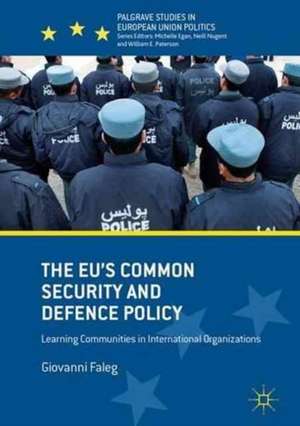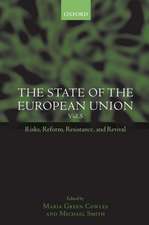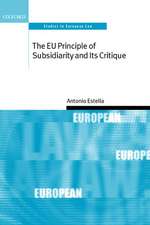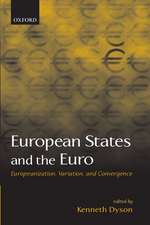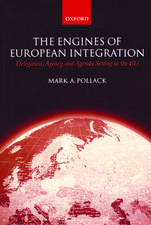The EU's Common Security and Defence Policy: Learning Communities in International Organizations: Palgrave Studies in European Union Politics
Autor Giovanni Falegen Limba Engleză Hardback – 9 noi 2016
| Toate formatele și edițiile | Preț | Express |
|---|---|---|
| Paperback (1) | 777.03 lei 6-8 săpt. | |
| Springer International Publishing – 23 iun 2018 | 777.03 lei 6-8 săpt. | |
| Hardback (1) | 781.77 lei 6-8 săpt. | |
| Springer International Publishing – 9 noi 2016 | 781.77 lei 6-8 săpt. |
Din seria Palgrave Studies in European Union Politics
- 20%
 Preț: 691.32 lei
Preț: 691.32 lei - 20%
 Preț: 691.52 lei
Preț: 691.52 lei - 9%
 Preț: 798.62 lei
Preț: 798.62 lei - 20%
 Preț: 755.99 lei
Preț: 755.99 lei -
 Preț: 282.28 lei
Preț: 282.28 lei - 18%
 Preț: 889.75 lei
Preț: 889.75 lei - 20%
 Preț: 690.39 lei
Preț: 690.39 lei -
 Preț: 243.89 lei
Preț: 243.89 lei -
 Preț: 388.72 lei
Preț: 388.72 lei -
 Preț: 388.72 lei
Preț: 388.72 lei -
 Preț: 393.52 lei
Preț: 393.52 lei -
 Preț: 392.60 lei
Preț: 392.60 lei -
 Preț: 390.25 lei
Preț: 390.25 lei -
 Preț: 390.63 lei
Preț: 390.63 lei -
 Preț: 389.70 lei
Preț: 389.70 lei -
 Preț: 387.96 lei
Preț: 387.96 lei -
 Preț: 391.61 lei
Preț: 391.61 lei -
 Preț: 391.61 lei
Preț: 391.61 lei -
 Preț: 392.60 lei
Preț: 392.60 lei -
 Preț: 386.81 lei
Preț: 386.81 lei -
 Preț: 390.63 lei
Preț: 390.63 lei -
 Preț: 386.00 lei
Preț: 386.00 lei -
 Preț: 392.60 lei
Preț: 392.60 lei -
 Preț: 388.72 lei
Preț: 388.72 lei - 15%
 Preț: 645.79 lei
Preț: 645.79 lei -
 Preț: 391.61 lei
Preț: 391.61 lei - 15%
 Preț: 645.47 lei
Preț: 645.47 lei -
 Preț: 392.21 lei
Preț: 392.21 lei -
 Preț: 386.81 lei
Preț: 386.81 lei -
 Preț: 390.63 lei
Preț: 390.63 lei -
 Preț: 390.63 lei
Preț: 390.63 lei -
 Preț: 387.75 lei
Preț: 387.75 lei -
 Preț: 389.88 lei
Preț: 389.88 lei -
 Preț: 388.52 lei
Preț: 388.52 lei -
 Preț: 391.61 lei
Preț: 391.61 lei -
 Preț: 400.26 lei
Preț: 400.26 lei -
 Preț: 387.75 lei
Preț: 387.75 lei -
 Preț: 386.81 lei
Preț: 386.81 lei -
 Preț: 388.72 lei
Preț: 388.72 lei -
 Preț: 389.88 lei
Preț: 389.88 lei -
 Preț: 391.61 lei
Preț: 391.61 lei -
 Preț: 389.70 lei
Preț: 389.70 lei -
 Preț: 386.81 lei
Preț: 386.81 lei -
 Preț: 389.88 lei
Preț: 389.88 lei -
 Preț: 388.72 lei
Preț: 388.72 lei - 15%
 Preț: 643.48 lei
Preț: 643.48 lei - 15%
 Preț: 582.63 lei
Preț: 582.63 lei -
 Preț: 398.35 lei
Preț: 398.35 lei - 15%
 Preț: 644.18 lei
Preț: 644.18 lei
Preț: 781.77 lei
Preț vechi: 953.37 lei
-18% Nou
Puncte Express: 1173
Preț estimativ în valută:
149.59€ • 156.58$ • 124.51£
149.59€ • 156.58$ • 124.51£
Carte tipărită la comandă
Livrare economică 31 martie-14 aprilie
Preluare comenzi: 021 569.72.76
Specificații
ISBN-13: 9783319413051
ISBN-10: 3319413058
Pagini: 257
Ilustrații: XVII, 228 p. 7 illus.
Dimensiuni: 148 x 210 x 21 mm
Greutate: 0.44 kg
Ediția:1st ed. 2017
Editura: Springer International Publishing
Colecția Palgrave Macmillan
Seria Palgrave Studies in European Union Politics
Locul publicării:Cham, Switzerland
ISBN-10: 3319413058
Pagini: 257
Ilustrații: XVII, 228 p. 7 illus.
Dimensiuni: 148 x 210 x 21 mm
Greutate: 0.44 kg
Ediția:1st ed. 2017
Editura: Springer International Publishing
Colecția Palgrave Macmillan
Seria Palgrave Studies in European Union Politics
Locul publicării:Cham, Switzerland
Cuprins
Abstract.- Acknowledgments.- Table of Contents.- List of Tables and Figures.- List of Abbreviations.- Preface.- Chapter 1 Introduction: ideas that changed the EU’s Common Security and Defence Policy.- Chapter 2 The framework of analysis: learning communities in international organisations.- Chapter 3 A comprehensive approach to EU security.- Chapter 4 The EU security architecture and networked governance.- Chapter 5 The EU’s engagement in Security Sector Reform and Civilian Crisis Management.- Chapter 6 Learning communities in EU Security Sector Reform.- Chapter 7 Learning communities in EU Civilian Crisis Management.- Chapter 8 The EU’s Common Security and Defence Policy: learning by doing.- Chapter 9 Conclusions: lessons learned and future challenges.- Postface.- References.- Appendix 1: Interviews (institutional affiliations).- Appendix 2: Questionnaire SSR.- Appendix 3: Questionnaire CCM.- Index.
Notă biografică
Giovanni Faleg is Consultant for the World Bank Group in Washington, DC, USA, and a Researcher at the Centre for European Policy Studies (CEPS) in Brussels, Belgium. He holds a Ph.D. in European Studies from the London School of Economics and Political Science (2014). He co-authored the report “More Union in European Defence” of a CEPS Task Force chaired by Javier Solana (2015).
Textul de pe ultima copertă
This book accounts for transformations in the EU’s Common Security and Defence Policy (CSDP) during its first decade of operations (2001-2011), and argues that the EU evolved into a softer and more civilian security provider, rather than a military one. This learning process was driven by transnational communities of experts and practitioners, which acted as engines of change. Giovanni Faleg analyses two innovative concepts introduced in the EU security discourse since the late 1990s: security sector reform (SSR) and civilian crisis management (CCM). Both stem from a new understanding of security, involving the development of non-military approaches and a comprehensive approach to crisis management. However, the implementation of the two policy frameworks by the EU led to very different outcomes. The book explains this variation by exploring the pathways by which ideas turn into policies, and by comparing the transformational power of epistemic communities and communities of practice.
Caracteristici
Offers an original alternative perspective to many of the established ways of thinking about the European Union’s Common Security and Defence Policy and change related to that policy Provides a timely contribution to the literature on CSDP, especially given the current questions surrounding the EU’s ability to serve as a security provider Builds on a number of alternative theoretical approaches to feed into theories of socialization and institutionalization
